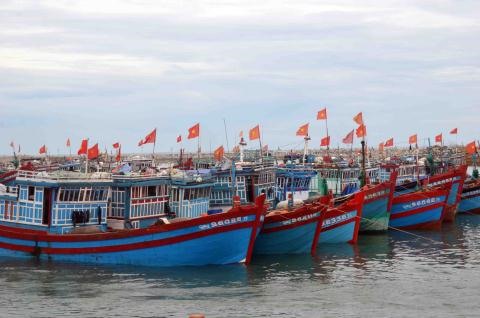.jfif) Opinion
Opinion

Nguyễn Quốc Hùng, director general of the Credit Department under the State Bank of Việt Nam, speaks to the Thời báo Kinh tế Việt Nam (Việt Nam Economic Times) newspaper on the need to extend credit to fishermen to help them stay at sea.
 |
Nguyễn Quốc Hùng, director general of the State Bank of Việt Nam’s Credit Department speaks to the Thời báo Kinh tế Việt Nam (Việt Nam Economic Times) newspaper on the need to extend credit to fishing households to help them stay at sea.
Will you further explain Government Decree 67 on lending credits to fishing households, either to buy or build new fishing boats or to refurbish their old ones?
In the first eight months of 2017, commercial banks committed to lending over VNĐ10.353 trillion (US$455.53 million) to fishing households which are beneficiaries of Government Decree 67. Of this amount, VNĐ 9.153 trillion ($402.73 million) has been disbursed, an increase of 19.3 per cent compared to 2016.
Under Government Decree 67 issued in July, 2014, 28 coastal localities had successfully processed 2,057 fishermen’s dossiers for making new fishing boats. But until now, only 1,236 have been submitted to banks, of which 106 have either been withdrawn or rejected by the banks due to their failure to meet bank requirement.
By now, some debts are overdue and some have become bad debts. The debts are worth hundreds of billions of đồng. Do you have any comments on the serious outstanding problem?
Risks have been incurred by the banks. In my opinion, this problem should be attributed to the Government Decree and the poor co-ordination between concerned agencies, particularly boat owners - the borrowers. When the due date came, many didn’t have money to pay back their debts. This is the key reason leading to overdue and bad debts. Bad debts have been reported in 12 of the 28 coastal provinces and cities. A total of almost VNĐ636 billion ($28,000), including the 12 overdue debts, have been turned into bad debts totalling almost VNĐ174 billion ($7,650). The key reasons leading to these problems include the low quality of some new fishing boats, including inappropriate designs coupled with some owners lacking the appropriate skills to operate them.
All lending banks have lamented that insurance for the new vessels is for only three years, while the operating cycle of the boats is between 11-16 years. How should we solve this problem?
If there is no insurance, fishermen will not go to the high sea for fishing. This will make the banks worry they might lose their investment.
More recently, the Ministry of Finance issued an instruction asking insurance companies to extend their insurance scheme under Decree 67 until December 31 this year. The Government Decree states clearly that boat owners will receive annual financial support for insurance of the vessels. It also states clearly that if any damage occur to the boat, if the boat is insured, the settlement will be based on the boat insurance agreement.
That means that fishing boats insurance must be extended from three to 11 years for steel boat hulls and 16 years for composite hulls. This will become a big problems for the banks!
According to the development plan for offshore fishing fleets, the number of fishing boats has already surpassed the targets. Does the Credit Department have any comments on this issue?
In my opinion, the Government should reconsider whether the banks should continue to extend the credit policy to build new vessels or not; or to up grade the existing fleet.
It is suggested that we should focus on investment in fishing logistics, including fish processing, to improve the quality of processing. In addition, we should also invest in improving the skills of fishermen, particularly their skills.
The Government and concerned agencies have seen eye to eye on the need to revise Decree 67. In your opinion, what contents in the document should be given attention?
There are four points that should be considered. They are:
First, the number of the fishing boats and their power;
Second, we need to have specific rules on how to settle debts when vessels are of low quality or the manufactures do not follow the design models.
Third, the Government should have a special article on the finding new boat owners if one dies or is too ill to continue work.
And finally, the Government should agree to financial support for boat owners to buy insurance.— VNS